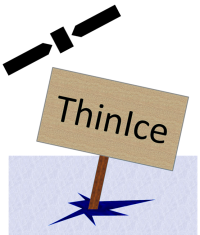Objectives
Objectives
Detection and quantification of thin sea ice for climate monitoring in the Arctic
Within this project, ThinIce, we will examine whether this approach is a useful way towards an operational algorithm for monitoring and quantifying thin sea ice. Both the identification of the sea ice extent as well as the retrieval of its thickness are important variables that will be addressed.
The overall objective of the project is to develop a pre-operational multi-sensor algorithm for retrieval of the thickness of first-year sea ice from satellite data. The sub-objectives of the project are:
- To determine whether first-year sea ice thickness can be retrieved from satellite data
- If sea-ice thickness can be retrieved, then to develop an operational retrieval algorithm
If thin sea ice thickness retrieval from satellite data is successful, it will make global monitoring of this variable possible. This means that thickness and variability of the thickness over time for the first time could be observed operationally. Operational thin sea ice thickness monitoring will make improved energy balance modelling possible, which is in particular important for modelling the processes in the Arctic and Antarctica. In most climate models, energy balance processes in these areas are very much simplified. Improved climate modelling in polar areas could potentially have a significant impact on long-term climate change projections on the global scale. Furthermore, the area extent of thin sea ice is an important indicator of climate change when measured systematically over time. Sea ice trend analysis could be significantly improved by operational use of the algorithm, providing significantly more accurate trend information on the global, regional and local scale.
For operational implementation, the algorithm could be adapted and implemented for the Sentinel-3 mission's SLSTR temperature radiometer. A multi-sensor approach combining optical and microwave data might have the largest potential, which may be considered later.

